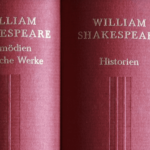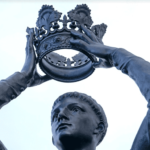George Orwell’s 1984 is one of the most influential dystopian works of literature ever written. Set in the future of 1984, this hauntingly prescient political novel presents a world forever under the iron rule of Big Brother, a totalitarian government that seeks to control and manipulate its citizens through language, surveillance, and perpetual war. Dive into this summary/synopsis of “1984” to explore Orwell’s timeless classic!
Introduction to 1984 by George Orwell
Orwell’s Nineteen Eighty-Four is the story of one man’s struggle against the omnipotent government of a dystopian society. The novel is set in Oceania, one of the three superstates that emerged from the ashes of the world war. The superstates are perpetually at war with one another to maintain their grip on power.
The protagonist, Winston Smith, is a lower-level member of the ruling Party in London, known as Airstrip One. He is part of the Thought Police, which aims to root out and punish thoughtcrime. Winston begins questioning the Party’s ideology and starts a secret diary in which he records his thoughts.
He also develops a relationship with a fellow rebel named Julia. Together they begin to mount a resistance against the Party. However, they are eventually betrayed and captured by the authorities. Winston is tortured and brainwashed to force him to conform to the Party’s will. But even after he has been broken, Winston still cannot betray Julia. Ultimately, he accepts his fate and learns to love Big Brother.
Orwell’s vision of the future in 1984 is a government-controlled society in which citizens are kept in line through strict rules and surveillance. His novel describes a world where people cannot think for themselves or express their opinions. The government controls everything, including the media and history itself. Citizens are divided into the Inner Party, the Outer Party, and the Proles. The Inner Party is the ruling class, the Outer Party is the middle class, and the Proles are the working class. The government keeps the people in line by using fear, propaganda, and mind control.
Plot Summary
The novel is set in a future world where the government controls everything. The people are kept in line by strict rules and surveillance. One man, Winston Smith, rebels against the government and starts a revolution. He is captured and tortured, but he never gives up. In the end, he is executed, but his memory lives on.
Character Breakdown
In “Character Breakdown,” George Orwell analyzes the characters in his novel, “1984”. He begins by discussing the protagonist, Winston Smith, and his various attributes. He then describes the other major characters in the novel, including O’Brien, Julia, and Big Brother.
Analysis of the Novel: Theme, Structure, and Writing Techniques
1. Analysis of the Novel: Theme, Structure, and Writing Techniques
Orwell’s novel is an important political and social commentary on the state of society in the early 21st century. The story follows the life of Winston Smith, a government employee who lives in a dystopian world where the government controls everything. Winston’s journey explores the themes of freedom, control, and rebellion as he meets a woman named Julia and starts questioning the government’s authority.
The novel is structured as a series of diary entries written by Winston. This allows Orwell to explore different aspects of his themes and creates a feeling of intimacy with the reader. His writing style is straightforward and often sparse, which reflects the harsh reality of Winston’s world.
Comparison to Other Dystopian Novels
During dystopian literature, George Orwell’s is often one of the first titles that come to mind. And for a good reason— it has greatly impacted the literary and cinematic world since its publication in 1949.
However, compared to other dystopian novels, it’s important to remember that this novel was published nearly seventy years ago. This means that some of the book’s context may need to be recovered for modern readers. To fully appreciate, it’s necessary to understand Orwell’s time’s social and political climate.
With that in mind, here are three ways in which it compares to other dystopian novels:
1) The level of detail: One of the most striking things about is the detail Orwell includes in his descriptions of the world he creates. Other dystopian novels, such as Aldous Huxley’s, can feel vague in comparison. This may be because it was written when many people were still unfamiliar with the concept of a dystopia. As a result, Orwell felt it necessary to explain his vision in great detail.
2) The role of government: In most dystopian novels, the government is presented as an all-powerful entity controlling every aspect of its citizens’ lives. However, what sets it apart is the extent to which this control is exerted. In Orwell’s novel, the government is not only oppressive but actively seeks to control the thoughts and beliefs of its citizens through propaganda and mind control.
3) The sense of hopelessness: While many dystopian novels present readers with the hope that good will be able to triumph over evil, they provide little in the way of optimism. Given the context in which it was written, this lack of hope makes sense. However, it is unique among other dystopian works in its uncompromising view of humanity’s bleak future.
Ultimately, compared to other dystopian novels, it requires a thorough understanding of the context in which it was written and an appreciation for its similarities and differences. By doing so, readers can gain an even greater appreciation for the power of Orwell’s words.
In comparison to other dystopian novels, George Orwell’s Nineteen Eighty-Four stands out for its level of detail in describing the world he creates and the oppressive control that the government exerts on citizens. The novel also provides a unique hopelessness that sets it apart from other works in its uncompromising view of humanity’s bleak future. While many dystopian tales offer readers a glimmer of hope, Orwell presents none, creating a striking contrast between his novel and others.
Relevance in Today’s World
In George Orwell’s 1984, the protagonist Winston Smith lives in a society where the government controls everything. The government tells the people what to think and how to behave. If they don’t comply, they are punished. Although this may seem far-fetched, there are many parallels between the society in Orwell’s novel and our own. In both societies, the government controls the media and uses it to control the population. In both societies, people are afraid to speak out against the government. And in both societies, people are under surveillance. The difference is that we have more freedom than Winston Smith does in our society. We can choose what to believe and how to behave. But even though we have more freedom than he, we are still not free from government control.
In a world where “fake news” is rampant, and everyone seems to be fighting for their version of the truth, the relevancy of George Orwell’s 1984 could not be more apparent. In his novel, Orwell paints a picture of a society controlled by an all-seeing, all-knowing government entity known as The Party. The Party controls everything in this society, from the media to the history books, and anyone who does not fall in line risks being labeled a “thought criminal.”
While some argue that we are not living in a world of Orwell’s dystopian vision just yet, there are certainly elements of it that can be seen in our society. The rise of fake news and alternative facts has called into question the reliability of what we see and read, while social media has given us a platform to share our version of the truth. It’s important to remember that in a world where everyone is fighting for their version of the truth, questioning everything is more important than
Conclusion
George Orwell’s 1984 remains a classic work of dystopian science fiction to this day. It warns readers about the dangers of totalitarianism, government surveillance, and oppression. By telling a story in an alternate version of England and attempting to illustrate what happens when freedom is taken away, he shows us clearly why liberty is so important and why we must fight for it. 1984 has inspired authors worldwide since its first publication in 1949, proving that its messages are as relevant today as they were then.
With its thought-provoking ideas, 1984 by George Orwell is a timeless classic that stands the test of time. It paints an intriguing picture of a future dystopian world in which the government controls every aspect of its citizens’ lives. As we move closer to our version of that society today, this book serves as both a warning and reminder of just how important personal freedom can be, especially regarding what we say or think. Whether reading for pleasure or enlightenment, this masterpiece will leave you with plenty to ponder long after finishing the last page.





